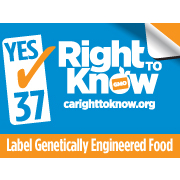
10 Aug EARTH MATTERS: JUST LABEL IT
 Between tax returns and food ingredients, it seems hiding information is the order of the day.
Between tax returns and food ingredients, it seems hiding information is the order of the day.
Massive “life science” corporations like Monsanto and DuPont, multinational food corporations like Pepsico and ConAgra, and biotechnology and grocery trade organizations like the Grocery Manufacturers Association are fighting against a ballot initiative in California that would require genetically modified organisms (GMOs) and food products containing them to be labeled.
Unlike the European Union, Japan, Thailand, Korea, China, Russia, and Brazil, among other countries, the United States currently does not require GMOs to be labeled. The current modus operandi for biotechnology labeling issues in the U.S. has been to label based only on end product, not the process used to develop the product. That is, if the end product is “substantially equivalent” to the baseline product it is being compared to (GM corn that creates its own pesticide is compared to conventional corn, for example), regulators do not require labeling. However, this process is not universally the case, even in the US. Irradiated foods, for example, which are typically held out as substantially equivalent to non-irradiated foods, are nonetheless labeled, because of uncertainties involved in the irradiation process.
The US Food and Drug Administration (FDA) guidance on labeling suggests that only material differences – including differences in the composition, nutritional, or functional properties of the food – justify labeling. In fact, however, past practice as well as public policy purposes argue against this determination and support labeling. There are three main issues at play here: first, the question of labeling based on “product versus process,” closely related to the idea of substantial equivalence, the U.S. basis for not labeling; second, the importance of traceability and monitoring; and third, the issue of consumer information and choice.
Choice is critical. In this age of food scares consumers increasingly want more information about their food. It is clear that the American people want to know what they are eating: country of origin labeling, organic labeling, and non-rBGH (recombinant bovine growth hormone) labeling all speak to this.
In response, there have been efforts to change FDA policy at both the federal as well as state level. The only successful effort to date is in Alaska, where the legislature in 2005 passed a labeling requirement for all farm-raised halibut, salmon or sablefish, even in restaurants, as well as for genetically-modified farmed genetically modified seafood. A decade ago in 2002, Oregon tried to pass a ballot initiative requiring GMO labeling that eventually failed by a wide margin after proponents were outspent by an even wider margin ($200,000 versus over $5.5 million).
Now California’s “Right to Know” campaign has been attracting attention around the country.
In June, the California Secretary of State announced that ballot issue 37, the California Right To Know Genetically Engineered Food Act, qualified to be on the November 6 ballot. (See http://www.labelgmos.org and http://www.carighttoknow.org for more information). This initiative would, in the words of its proponents, “…require clear labels letting consumers know if foods are genetically modified. We already have food labels showing nutrition, allergy information and other facts consumers want to know. This measure simply adds information telling us if food is produced using genetic engineering, which is when food is modified in a laboratory by adding DNA from other plants, animals, bacteria or viruses.”
If California passes labeling legislation, there will certainly be legal challenges, but it will also give a huge boost to the movement to label GMOs, which has started gaining momentum all over the United States. The “Just Label it” campaign to change current FDA policy has over 500 member organizations, and has collected over one million signatures (see http://justlabelit.org to find out more about this campaign). If the California ballot initiative passes this fall, over twenty years after GMOs were first commercialized in the US, there is a very real chance that they will finally be labeled. In turn, U.S. consumers, who have been eating GMOs in almost all processed foods, will finally have a choice as to what they eat.



Sorry, the comment form is closed at this time.